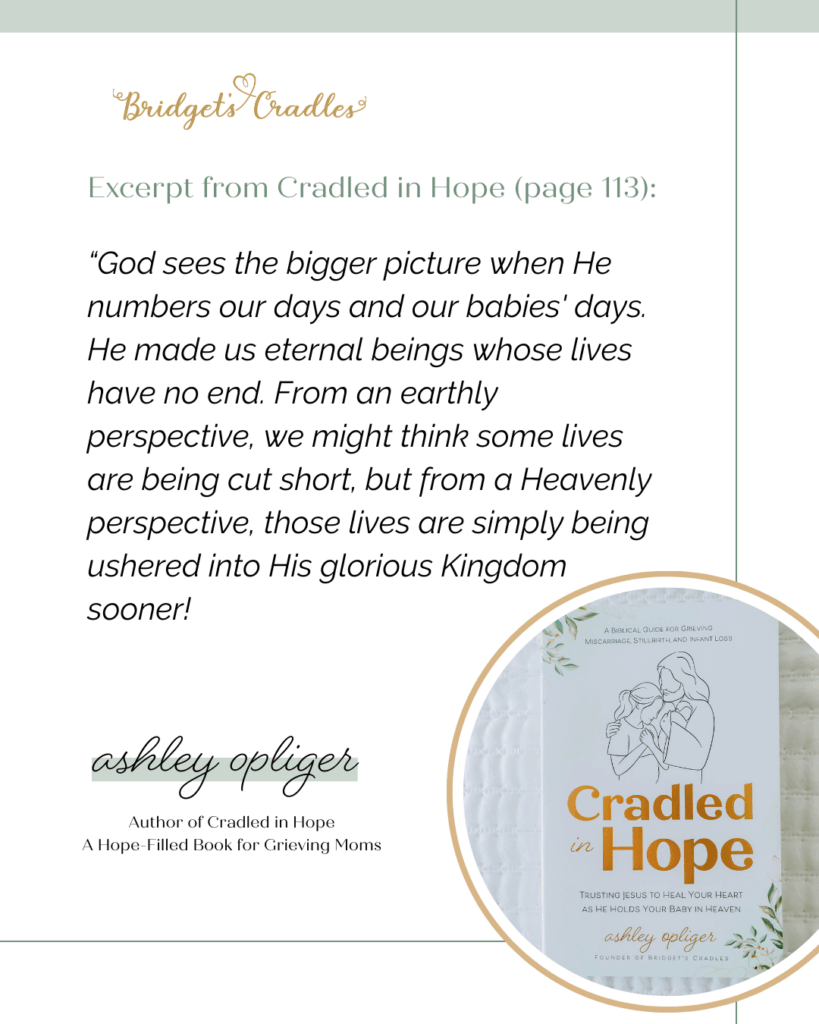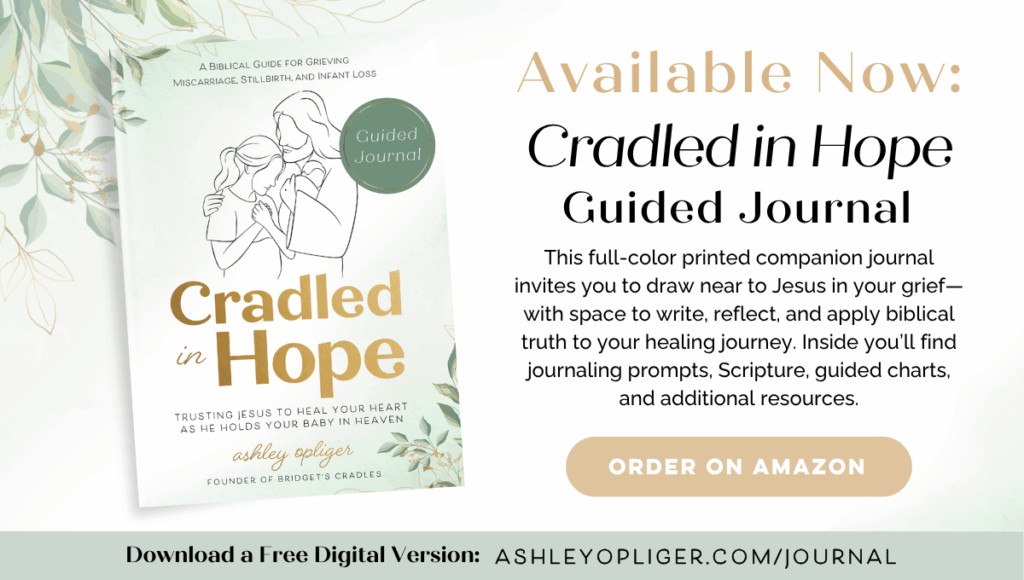Wave of Light | October 15, 2025 Register Now
registration open!
Ep 7 | Cradled in Hope Book Club | Ashley Opliger
September 23, 2025
filed under

In this episode, Ashley walks tenderly through one of the hardest struggles grieving mothers face: trusting that God is still good, even after the loss of a baby. In Chapter 6 of Cradled in Hope, “For He is Good: When You Question Who God Is,” she unpacks the emotional, theological, and spiritual wrestlings that come when prayers go unanswered—and babies die.
To help grieving hearts rebuild trust in God’s character, Ashley shares five biblical attributes that anchor our faith in who God is, even in the most devastating times of life. This chapter is structured around these five truths as pillars of hope for moms who are asking, “If God is good, why did this happen?” With honesty, compassion, and Scripture, Ashley reminds us that God’s goodness is not changed by our circumstances—but by His unchanging character.
The 5 Key Attributes of God that Ashley explores in the chapter:
- God is Good– He is blameless, loving, and kind.
- God is Sovereign – He is in control, even when our lives feel like chaos.
- God is Just– He is fair and righteous, and will make all things right one day.
- God is Faithful– He keeps His promises and never leaves us.
- God is Immutable (Unchanging) – His character never changes. He is constant and secure.
Ashley acknowledges how grief can shake our faith and make us question everything we thought we knew about God. But rather than hiding from the hard questions, she invites us to bring them into the light. Through Scripture and personal experience, she guides listeners back to the firm foundation of who God is, even in the midst of their heartbreak.

Journaling Prompt
Which of the five attributes of God are you struggling to believe right now? Be honest with Him. Write about how your view of God has changed in grief—and which truth you most need to cling to today.
Healing Step
Write the Faith Declaration from the attribute above on a notecard or sticky note. Place it somewhere you’ll see daily to remind yourself of who God is.

Full transcript below.

New episodes will be shared on the 1st of every month. Don’t miss a single episode…subscribe wherever you podcast!
Please also leave a review to help spread the message of hope with other grieving mommas!

MEET OUR HOST
Ashley Opliger is the Executive Director of Bridget’s Cradles, a nonprofit organization based in Wichita, Kansas that donates cradles to over 1,600 hospitals in all 50 states and comforts over 30,000 bereaved families a year.
Ashley is married to Matt and they have three children: Bridget (in Heaven), and two sons. She is a follower of Christ who desires to share the hope of Heaven with families grieving the loss of a baby.
Connect with Ashley:
Facebook /ashleyopliger
Instagram @ashleyopliger
Pinterest /ashleyopliger
www.ashleyopliger.com
Follow Bridget’s Cradles:
Facebook /bridgetscradles
Instagram @bridgetscradles
Pinterest /bridgetscradles
www.bridgetscradles.com
JOIN OUR FACEBOOK GROUP FOR GRIEVING MOMS

EPISODE TRANSCRIPT
Ashley Opliger: [00:00:00] Welcome to the Cradled in Hope Podcast Book Club.
I’m your host, Ashley Opliger—grieving mom, author of Cradled in Hope, and founder of Bridget’s Cradles. I’m so honored to walk with you through my book, one chapter at a time, as we navigate the heartbreak of losing a baby together.
After my daughter Bridget went to Heaven at 24 weeks, I wrestled with deep sadness and complex questions about God’s goodness. But through that grief, Jesus showed me that He not only cradles our babies in Heaven, He also holds our broken hearts here on earth.
Whether you’re reading along or simply listening in, this is a safe space for your sorrow—a place where your tears, questions, and raw emotions are welcome. Each episode, we’ll reflect on a chapter of Cradled in Hope and gently walk together from heartbreak to healing, and from pain to purpose.
My prayer is that this podcast will remind you that you are not alone in your grief and, most importantly, that it will point you to Jesus, the only One who can truly heal your heart. Through faith in Him, there is hope to see your baby again, and He will be with you every step from here to Heaven.
So wherever you are in your journey, I invite you to join me—and together, we will grieve with hope.
Let’s begin.
Ashley Opliger: [00:01:22] Hi friends. Welcome back. Today, we are diving into Chapter Six, For He is Good: When You Question Who God Is.
[00:01:29] Throughout this chapter, we are going to turn to His Word instead of relying on our feelings to remind ourselves of His true nature. We are going to focus on five key attributes of God that are most often clouded by grief: His goodness, sovereignty, justice, faithfulness, and immutability.
In my book, I chose these characteristics because, in my journey, these were the ones that I felt like I really needed to get a good biblical understanding of God’s true nature in order for me to trust Him through my grieving journey.
[00:02:01] And so this chapter is outlined a little bit differently than my other chapters. This one actually has a section title for each of the attributes, and there’s a Bible verse, and then I talk through the theology and the different points that I’m wanting to make about that characteristic. And then it ends with a faith declaration and supporting Scripture for that particular attribute, and then it goes on to the next one, He is sovereign. And so that’s what the layout of this chapter is.
And today what I’m going to do is give a very brief summary of each of those attributes, and then, of course, you could go read the book and dive in deeper and find more Scripture to really saturate yourself in His Word, to help you have a good understanding of who God is.
And so let me give you a little backstory on this particular chapter and how it came to be before we dive in. This is just a behind-the-scenes thing that no one really knows, but when I first started writing all of the messages for our support groups for Bridget’s Cradles, I would write out these little messages. I call them messages. They’re not sermons, but basically like a topic that we would cover in a particular support group.
And so one of the very first messages that I ever wrote for our support groups in person, because we started our support groups in 2018, and then it wasn’t until 2020 when COVID happened that we started Hope Online, and we’ve been doing Hope Online for the last five years.
[00:03:29] But the first message I ever wrote was called Forgiving God, Forgiving Yourself, and Forgiving Others, because, for me, I felt like I needed to forgive God because I felt like He had abandoned me, and I didn’t understand why a good God would allow a baby to die.
I needed to forgive myself because I felt like my body had failed me, and I had serious bitterness against my body and a lot of shame. And Forgiving Yourself ended up being a different chapter, which is actually going to be the chapter we’re going to cover next episode, which is Grace Upon Grace: When You Can’t Forgive Yourself. So that part of the message ended up being its own chapter.
[00:04:11] And then the third one was Forgiving Others, which, that ended up being the chapter after Grace Upon Grace, which is They Know Not What They Do: When You Are Hurt By Others.
And so essentially what you’re seeing here in my book, Chapters Six, Seven, and Eight, all came from the very first message I wrote for support group, Forgiving God, Forgiving Yourself, and Forgiving Others.
[00:04:33] Now, the reason this is no longer called Forgiving God and why I do not use that term anymore, except for to explain to you that I once used that term and I no longer do, is that God does not need to be forgiven. He is good and holy and righteous. There is nothing in Him that needs to be forgiven. He has not done anything wrong.
And so even though from my earthly perspective was that I felt like I needed to forgive Him because I felt like He wronged me by allowing something bad to happen to me, obviously that is full of major theological errors, and so I have stopped using that term. I do not feel as though we should say that we need to forgive God because He does not need to be forgiven. In fact, we are the ones that need to be forgiven because we are sinners in need of a Savior.
[00:05:20] And so really that message that I wrote, which was essentially me wrestling with who God is and why would He let this happen and all of these things that I was believing about Him, that’s what this chapter ended up being, For He is Good: When You Question Who God Is, because I think we do question who He is, especially when we’re going through grief, trauma loss and pain, difficult trials in our life.
[00:05:44] And so what’s really neat is that this core message, which was the very first message I wrote, ended up being these three chapters in the middle of my book. I have a hard time believing that any chapter in my book is not core content. I would not be able to take any chapter out. In fact, I added chapters that I had really felt like God placed on my heart.
[00:06:03] But the reason they’re tucked in the middle is because the first chapters I feel really set a biblical foundation for the rest of the book. And hopefully as you’ve been reading the book, the first chapters are really foundational in helping you understand that I am someone who you can trust and that I have walked through this pain, but more importantly is that you can trust Jesus, and that He really is who He said He is, and He is a firm foundation that we can put all of our faith and all of our hope.
[00:06:31] And so that’s why we get to this chapter later, and we really go into some theology into God’s nature. And you know what’s interesting about this chapter is that a lot of times when I talk about God or Jesus, I think of them together because they are. They’re part of the Trinity. They are both God, but they are also distinct.
[00:06:51] There’s God the Father, Jesus the Son, and then the Holy Spirit. They are all God, but they are different entities, if you will. And so as we had talked about Jesus in some of the earlier chapters, I think when I’m talking about For He Is Good, I’m talking about God the Father here. And, of course, all of these characteristics apply to Jesus and the Holy Spirit because all of them are the same God.
[00:07:18] But for some reason, as I was writing this particular chapter, I am feeling in my heart that I’m talking about God the Father. Why am I telling you that? Because I don’t know about you, but sometimes I have an easier time relating to Jesus. And I see Jesus as the Savior who died on the cross. You read the Gospels —Matthew, Mark, Luke, and John —and you relate to Him because of His humanness. Right?
[00:07:43] But then you read the Old Testament and you read about God the Father, and all of the things that happened with the Israelites and God’s wrath. And sometimes I feel like we can see God the Father in a very different view than we see Jesus the Son. Tell me if I’m the only one that feels that way, but sometimes I felt that way.
[00:08:02] And I think as Christians, we [often mistakenly] view the Old Testament God as a different God from the God of the New Testament. And that’s also not true. God is the same yesterday, today, and forever. He has not changed.
And so, the difference between the Old and New Testaments is that we are no longer under the Old Covenant. There’s a New Covenant that was established through Jesus Christ and His sacrifice.
[00:08:27] And so, long story short, what I’m trying to get at here is that I’m hoping that this chapter will help you see God the Father in His right view, that He is a good and loving Father, and that He can be trusted.
And so let’s go into these attributes now, because this is so important. Because how we view God, as I’ve mentioned before in the book, really is going to impact our grieving journey and how we relate to Him in our time of sadness, because we have such a hard time reconciling that a good God would allow babies to die.
[00:09:02] And so let’s jump into He Is Good, the first attribute, His goodness. As we look at all the things broken in our world, which we don’t have to look very far, we can look in our own lives, we see tragedies, trials, loss, grief, pain, trauma. All of these things that can happen to us. If you’re listening to this podcast, you’ve lost a baby, most likely.
[00:09:25] You’re listening to this because you know that deep, deep grief of losing a child, and so you know that the world is broken and that things are not the way they should be. Babies should not die. And so we see that in our own lives, but also we look around and we see pandemics and genocides, child abuse, murder, drunk drivers, which is very specific to my own story.
[00:09:48] My dad was killed by a drunk driver last year. And so I see that and I think, “How could God allow that to happen? How could He allow innocent people to die at the hands of someone else’s sin?”
[00:09:59] We see cancer, we see wars. There are so many things that are wrong in our world, and we think, “If He is all-powerful, why is He not stepping in and stopping this?”
So often I feel like, “Well, why didn’t He intervene? Why would He not intervene in the situation with my dad? Why would He not get my dad out of the path of such a reckless driver? Why would He not intervene and make my womb a safe place for my daughter to live? If He’s all-powerful, why couldn’t He do that? Why would He not answer these prayers that are good and righteous prayers?”
[00:10:30] And ultimately those kinds of questions, which, if you’re asking those questions, by the way, there is nothing wrong with you. You should not feel shame for asking those questions.
[00:10:40] It is a human response to wonder why bad things happen to good people and to wonder why bad things happen at all. And hopefully, through my book, and we’ve addressed this in earlier chapters, I talk about the brokenness of the world and how that all came through the Fall. But I am a very deep thinker, and you’ve probably gathered that from listening to this podcast and reading my book. I’ve always considered myself an old soul.
And so one of the questions I’ve always wondered is: We know that sin and death came from the Fall, but why did God even have to allow that to happen in the first place? Why did He have to put the Tree of the Knowledge of Good and Evil in the Garden and allow there to be the serpent, Satan, Lucifer, all of these things?
[00:11:27] Have you ever thought about that? God could have made it so that there wasn’t sin and death to begin with, because we know eventually He’s going to destroy sin and death. And so my curious mind is wondering, “Why didn’t He just destroy it to begin with so we never had to deal with any of this?”
[00:11:42] And maybe this is the first time you’re thinking about that and you’re like, “Whoa. Now my mind is blown.” And I’m thinking, I’m wondering the same thing.
But I talk about how there has to be a reason why God allowed sin and evil to exist even with Him being good. And I do say in my book that I’m not going to pretend that I have the full answer as to why God allows evil to exist, because obviously God is infinitely wise and all-knowing, and so He has good reasons for these things.
But many theologians surmise that in order to experience God’s goodness, the antithesis of good must also exist. In other words, would we grasp how amazing He is if we didn’t have something to compare Him to?
[00:12:27] Perhaps God allowed evil to exist to display His love and mercy. Paul, the apostle, alluded to this when he said, “God has bound everyone over to disobedience so that He may have mercy on them all,” Romans 11:32. And so essentially, if we did not have evil, then He would’ve had to have made us without free will.
[00:12:47] And this is a very in-depth conversation. I have studied free will very extensively because there are a lot of theological implications that come from where you stand about what you believe about free will. And so I don’t want to go into all the different viewpoints that Christians may have about free will, but essentially free will is that God gave us the ability to make our own decisions and to ultimately decide if we want to accept and love Him, our Creator, or to reject Him.
[00:13:21] And I’ve always wondered, “Why would that be? Because if He didn’t make us with free will, then we would all just love Him. But if you think about it, love is best felt when it’s freely given. If you force someone to love you, is that real love? Would you really feel that in your heart and accept that as real love?
[00:13:39] But when you have someone who loves you of their own volition because they just truly love you, that is real true love. And I think if I had to surmise myself that God did not want a bunch of robots that were forced to love Him, that He desired to live with His Creation in the Garden of Eden, and then again eventually on the New Earth. He desired to be with His Creation, with people who love Him freely and worship Him of their own volition. That’s my thought.
[00:14:12] And so the reason I’m sharing this is because I think that’s why all of this exists to begin with, is because without having a choice, we wouldn’t be able to freely love Him.
And so there could obviously be many other reasons that God chose for things to be the way that they are, but because He has foreknowledge and He’s all-knowing, He knows the past from the future, and He knows everything that’s going to happen, He knew that this was all going to happen the way that it did.
And so when He put the Tree of the Knowledge of Good and Evil, and He allowed Lucifer to have free will to reject Him in Heaven and to take a third of the angels with him, He already knew that He had this redemption plan in Jesus to come about, and He had a way back to reconcile people to Himself.
[00:14:58] And so it’s very fascinating to really think about it, but as we talk about His goodness. I think we really have to understand that God has no evil in Him, and so He has to be good, because the Bible says, “God is light; in Him there is no darkness at all,” 1 John 1:5. He will always do what is right and cannot contradict His good nature. That’s a paraphrase of 2 Timothy 2:13.
[00:15:30] And so if you think of this, His goodness, all of His other attributes really flow from that. Because He is good, there is no sin or evil in Him, all of these other attributes about Him, His holiness, His righteousness, His mercy, and His love, flow out of the fact that He’s a good God.
[00:15:48] And I understand that it can be so hard to trust that He is good because we see all of these things happening in our own lives and in the world, and we think, “This doesn’t make sense.” We don’t understand how He could possibly sit up there on His throne and watch all of this.
[00:16:04] But we also have to understand that not only does He have a reason for it, but He has a solution to it. I already mentioned Jesus, the ultimate sacrifice that has overcome death and the grave and is giving us a way back to the Father.
But He also has a plan to punish sin and to destroy evil. And I think we sometimes forget about that aspect of God. And I know it’s scary to talk about His wrath, but He does believe that sin has to be punished. He cannot stand to be in the presence of sin.
[00:16:33] And so that is why one day He will throw Satan into the Lake of Fire, along with his demons and with those who choose to reject His free gift of salvation. Because in the eternal state, on the New Heaven and the New Earth, there will no longer be sin and death, and there will be no evil person that exists in that state.
[00:16:53] Sadly, evil must be punished, and that consequence is eternal separation from Him in Hell. And I know that’s scary to talk about. We’ve talked about that in a previous chapter. But I think it does help us trust in His goodness that all of these things that we see that are so evil and wrong, He is going to deal with them.
[00:17:12] In fact, I’ll never forget something that my pastor said after my dad was killed by a drunk driver, because I was grappling with the lack of a justice system on earth, that the laws are so lax for drunk driving and for the sentencing.
[00:17:27] And I won’t go into all of it because we’re still in the middle of the criminal case, but I am deeply grieved at the lack of laws in our own state of Kansas, but across the world, that this is still happening, that people are still being killed due to drunk and drugged driving. It shouldn’t be the way that it is, and part of that is due to the law.
[00:17:46] And so I was grappling with there’s just not going to be true justice, and my pastor said, “There will be justice, and this man’s sin is going to be dealt with either at the cross or at Judgment Day”.
And so if we think of that, with anything that we see in this world, all these horrible atrocities, we have to understand that God is going to deal with that either in His infinite mercy and grace, that if someone repents and believes in Jesus, He is going to cover that person in His blood, in His righteousness, and the cross will be the redemption of that sin, or it will be dealt with at Judgment Day, which will be experiencing God’s wrath and punishment. And so we have to trust in His goodness, that He has a reason for these things.
[00:18:33] And I’ve jumped along into His justice, which is another attribute. But let’s go into His sovereignty next. Essentially, sovereignty means that God is in control, that He has supreme power and authority over all His Creation.
[00:18:49] So God is omnipotent, which means all-powerful. He is omniscient, which means all-knowing and omnipresent, existing everywhere all at once. He has infinite wisdom and knowledge, and nothing is outside of His control.
And so being that He is sovereign, when I go back to that question, “Why did God allow sin to enter the world? Why did God let Lucifer fall from Heaven to begin with,” and talk about, “Why did He create angels and humans who can reject Him,” I talk about all of these things.
[00:19:18] And so one of the aspects of God’s sovereignty that I’ve always struggled with is the fact that the Bible says that God numbers our days. And so, losing a baby, I’ve always thought, “Why did God number Bridget’s days like that? Why was she never able to take a single breath on this earth? Why did He number my dad’s days the way that He did?”
And we can think that way for so many people because we think their lives were being cut short. And I always wonder why God allows babies to die before they can even make a single memory on this Earth.
[00:19:50] It’s really hard to grapple with these kinds of questions about God’s sovereignty, because if He numbers our days, it feels like, “Well, then that’s what He wanted for their lives, and why would He want that?”
[00:20:01] And through this chapter, I really talk through some of the mystery of this and the questions that you might have. But I basically say that I do believe that God numbered the days of Bridget’s life, and He knew that she would live 173 days inside my womb. Her days were ordained and written in God’s book before one of them came to be, Psalm 139:16.
[00:20:24] So does this mean His purpose was for her to be stillborn or that He just allowed it? I can’t say for sure, and I know that uncertainty may make us feel uncomfortable, and it brings us back to a never-ending loop of why questions.
But it does bring me peace to know Bridget fulfilled her life as He intended. So that doesn’t sound overly hope-filled, and I know that that really bothers me when I think about the fact that He numbered our days. And I’ve struggled with that, even with my dad’s death.
[00:20:53] And so something that has really helped me with this, and I’m going to read this directly from my book on page 113, I say that, “God sees the bigger picture when He numbers our days and our babies’ days. He made us eternal beings whose lives have no end.
[00:21:10] From an earthly perspective, we might think some lives are being cut short, but from a Heavenly perspective, those lives are simply being ushered into His glorious Kingdom sooner!
[00:21:19] Imagine a piece of infinite string representing our lives – green representing our time on earth and white representing our time in Heaven. Some people would have more green on their string than others. Yet all of our string lengths would be the same (never-ending).
[00:21:33] When we look at the string analogy from our vantage point on earth, we feel sad for the people with a shorter green span of string. But if we look down from Heaven and its perfect splendor, wouldn’t we feel sad for the people who had to endure this broken world longer? We would envy people who had more white on their strings. It’s all dependent on our perspective!”
Ashley Opliger: [00:21:53] We hope you’re finding encouragement in this episode so far. We want to take a moment to share some resources our ministry offers to support grieving moms like you.
On our website, bridgetscradles.com, you’ll learn more about our nonprofit and find many hope-filled resources, including free e-books to help you plan a memorial or funeral service for your baby, meaningful ways to honor your baby in your heart and home, and gentle guidance for navigating difficult days like due dates, Heaven Days, and holidays.
We invite you to join our community of grieving moms through our Christ-centered support groups, offered both in-person at our headquarters near Wichita, Kansas, and virtually through Hope Online. These gatherings provide a place to find comfort, connection, and biblical hope alongside other moms who understand your pain.
You can view upcoming dates and sign up on our website. While you’re there, we’d also be honored for you to share your baby’s story with us.
For ongoing support, we welcome you to join our private Cradled in Hope Facebook group—a safe space for grieving moms to find friendship and walk their healing journey together.
To stay connected with us and receive faith-filled encouragement, follow us on Facebook and Instagram at @bridgetscradles, @cradledinhope, and my personal page @ashleyopliger.
Now, let’s get back to the episode.
Ashley Opliger: [00:23:11] “Because God sees all of eternity, we should trust in His sovereignty and His plan for both our lives and our babies’ lives. The number of their days on earth has no bearing on their eternal dwelling. He’s holding them in His good and loving arms until we get there.”
[00:23:29] And so each section in this chapter has a faith declaration and supporting Scripture, as I mentioned before, and I’m going to read this one, but for the other ones, I’m going to let you read that in the book.
[00:23:39] But the faith declaration for He Is Sovereign says, “God is on His throne. He is in control. He is sovereign over my life and my baby’s life. We will live together forever.”
So that declaration is something for you to cling to that really summarizes that section of the book. And my hope is that you would write one of these down, whichever attribute that you’re having a difficult time trusting God’s character, and you would write it down somewhere where you could see it. Maybe a little sticky note on your bathroom mirror or on your nightstand, somewhere where you can see it every day to remind yourself who He is.
[00:24:07] The next one is He Is Just. Earlier, I had talked about this, how God is a God of justice. He will deal with sin and evil either at the cross or at Judgment, and there are many verses in the Bible that talk about this.
[00:24:31] One of them that I put in my book is that He is impartial and does not take bribes. Deuteronomy 10:17, and that God does not show favoritism, Romans 2:11. Justice and righteousness are the foundation of His throne, that’s from Psalm 89:14, and so we can rejoice over the fact that God is a just God, that He will make all things right.
[00:24:56] Right now, there are so many things wrong with this world, including the loss of our babies. This is not the way that He designed the world to be, and He has made a way for us to see our babies again. And He will one day wipe away every single tear, and He will bring about ultimate justice.
And I’m so thankful that He is a just God, and that in a world of injustices and in the things that grieve our heart, we know that God grieves with us, that He’s against these things, and that He will one day make everything right.
That is such an amazing hope to know that one day we will live on the New Earth forever with Him in a good and perfect Paradise.
[00:25:33] And so I want to talk about the next attribute, which is He Is Faithful. And this is important to know because God keeps His promises and He’s loyal. He does not turn back from His Word, and He does what He says He will do.
[00:25:46] And throughout the Bible, God uses the metaphor of marriage to describe the relationship between Christ and the Church. Paul explained to the Ephesians that in the same way the husband is head of his wife, Jesus is the head of His body, the Church. That’s Ephesians 5:23.
And so when I think about the fact that God is loyal and that He keeps His Word, that He’s not going to lie to you, He’s not going to leave you, He’s not going to abandon you, that gives me so much comfort.
Because I don’t know if you’ve ever walked through a difficult breakup or maybe a divorce, and you’ve had that rejection or betrayal from someone that you loved. Maybe it wasn’t a romantic relationship. It might have been a friendship or a family member. If you’ve ever been hurt by someone who went back on their word or they broke their promises to you, you know how painful it is.
[00:26:35] I have personally walked through this myself, and I think the enemy wants to use that kind of pain that we’ve experienced from other humans, especially if you’ve ever been hurt by a husband or a father figure, then you would possibly view God the Father in that same way.
We need to understand that God is not that way, that He’s always going to be there for you, and that He will never leave you.
[00:26:58] The Bible describes the kind of love that God has for us, and it’s a Greek word called agape, and it’s used over 100 times in the New Testament. And agape love is based on choice and commitment, not emotions or feelings. Jesus expressed this kind of love for us, a sacrificial, unconditional love.
[00:27:19] My prayer for you, as you read this, is that you will know that God loves you. He is loyal to His Word, and He will not break His promises. He is a promise-keeping God.
[00:27:29] Lastly, I want to share the attribute that He Is Immutable. What does immutable mean? Immutable means that He never changes. And that is the best news because that means that all of these other characteristics that we’ve talked about, that He’s just, that He’s good, that He’s faithful, that He’s sovereign, it means that those things will never change.
He’s always good because God never changes. If He’s faithful, that means He’ll always be faithful. And that gives us hope and encouragement because I don’t know about you, but when you’re walking through difficult trials, so often we view God based on our circumstances, and we think that He’s changing based on what’s going on in our lives or based on how we feel about Him or based on how we’re walking with Him in that current season. And we think that He might be more distant if we’re being more distant or if we’re turning our back on Him.
[00:28:19] But that’s not the case. God is always present, always there, always loving us, and He is not changing. There is no earthly experience, grief or loss that can shake His great love for you.
[00:28:31] And I want to end this episode with that because I think it’s so important to remember. All of His characteristics, His love, His mercy, His grace, have been present the entire time, from the Old Testament through the New Testament and on into eternity, that He is the same God yesterday, today, and forever. And He’s always going to love us with His unshakeable, never-changing, agape love.
And so I want to close with the Time With Jesus journal prompt. And I alluded to this earlier, but I asked you, “Which of the five attributes of God’s character is hardest for you to believe and why?”
[00:29:07] And then the Healing Step that I’m going to have with this is that I want you to memorize that faith declaration from the attribute you find hardest to believe, and repeat it out loud every day. Or write it down somewhere and put it somewhere you’ll be able to see it every day, so that you’ll be reminded of His good character.
[00:29:26] Let me close us now in prayer.
Jesus, I thank You so much for this time that we had to talk about Your character, that You’re good and sovereign, faithful and immutable, never changing.
Lord, I thank You that You’re with us in the midst of our questions and our doubts as we grapple with the circumstances that we’re walking through, this deep grief of losing a baby and missing them so much, and wondering where You are in all of this and who You are in the middle of our grief.
[00:29:56] And so, Lord, I pray that each mom who’s listening right now would turn to Your Word to have a firm understanding of who You are, that You are all of these things that we’ve talked about today and so much more. You are love, You are grace, You are mercy, You are kindness, and You’re never going to leave us in the midst of our pain.
[00:30:16] We thank You for being the God who sees us, who cares for us, who is on our side, who hates sin and death just as much as we do, that You grieve over the loss of our babies and You have made a way for us to see them again.
And so Jesus, I pray that for each mom listening right now, that You would allow these attributes to shine, they would be a focal point for her this week to reflect and remember who You are.
Lord, I pray that one particular faith declaration would really stand out so that she can be reminded of Your good nature, that You are going to be with her every step of the way through this journey. Lord, You are a God that is near to the broken-hearted.
[00:30:57] Thank You, Lord, for being a good Father and for sending Your perfect Son, Jesus, and filling us with Your Holy Spirit. We are so grateful for You. We love You. Amen.
[00:31:10] Be sure to tune in for next episode, which will cover Chapter Seven, Grace Upon Grace: When You Can’t Forgive Yourself.
Ashley Opliger: [00:31:19] Thank you for joining me for today’s episode of the Cradled in Hope Podcast Book Club.
New episodes covering each chapter of the book will release on the 1st, 15th, and 22nd of each month through the end of the year—so be sure to subscribe and follow along.
If you don’t have your copy of Cradled in Hope, you can find it wherever books are sold. It’s a biblical guide for grieving moms after miscarriage, stillbirth, or infant loss—filled with vulnerable emotion, biblical wisdom, practical guidance, and hope-filled encouragement.
To accompany the book, I’ve also created the Cradled in Hope Guided Journal—a beautiful companion that includes space to write your responses to the discussion questions, full Scripture passages from each chapter, and additional reflection pages and guided charts to help you process your grief and draw you closer to Jesus. You can download the free digital version on my author website at AshleyOpliger.com/Journal, or order the printed version on Amazon if you prefer to write by hand.
Until next time, know that you are not alone. You are seen, loved, and Cradled in Hope.
I have a fancy professional bio here, but what is most important for you to know is that my first and only daughter, Bridget, went to Heaven and Jesus was the only One who could put the shattered pieces of my heart back together. Maybe your heart is broken too?
If so, I'm here to be your friend and walk with you on your grief journey. More importantly, I'm here to point you to Jesus, the only One who can heal your heart and promise you eternity with your baby in Heaven. Hold my hand, friend, and let's start this journey together.
I'm a grieving mom who found comfort in Christ.
Welcome, I'm so GlaD You're Here
More Stories That May Speak to Your Heart
Additional Reads
Spotify
Apple
Ways To Listen
Hosted by Ashley Opliger, this podcast offers Christ-centered comfort to moms grieving the loss of a baby in Heaven. Each episode is rooted in Scripture and points your heart to the truth of the Gospel, the presence of Jesus, and the eternal hope of being reunited with your baby in Heaven.
Listen to Our Podcast
welcome to cradled in hope
Donate Online
Make an eternal impact. Your donation comforts grieving families with cradles, support, and the hope of Christ.
Find a Community
You don’t have to walk this road alone. Join a Christ-centered community of moms who understand your grief.
Read the Book
Discover comfort, hope, and biblical encouragement in Cradled in Hope, written by Ashley Opliger for grieving mothers after baby loss.
Christ-Centered Comfort and Guidance for Grieving Families
Honor your baby’s memory with kindness. Explore 50 thoughtful ideas—plus a free customizable RAK card to share their legacy of love.
Random ACts of Kindness in Memory of a Baby in Heaven
Find meaningful ways to honor your baby on birthdays, due dates, and holidays—offering remembrance through cherished traditions.
Honoring Your baby on Milestones and Holidays
Offer support to a grieving parent with practical ways to help and 12 heartfelt gift ideas designed to bring comfort during deep loss.
Supporting a Loved One After the loss of a baby
Navigate life after loss with gentle guidance for grieving, healing, and finding hope in the midst of heartbreak.
Grieving and Healing After the Loss of a Baby
free e-books
Grab your free copy
How To Grieve & Heal After The Loss of a Baby
Find hope in the heartbreak of pregnancy and infant loss. This guide offers practical ideas and faith-filled next steps in navigating a path forward in your grief.





